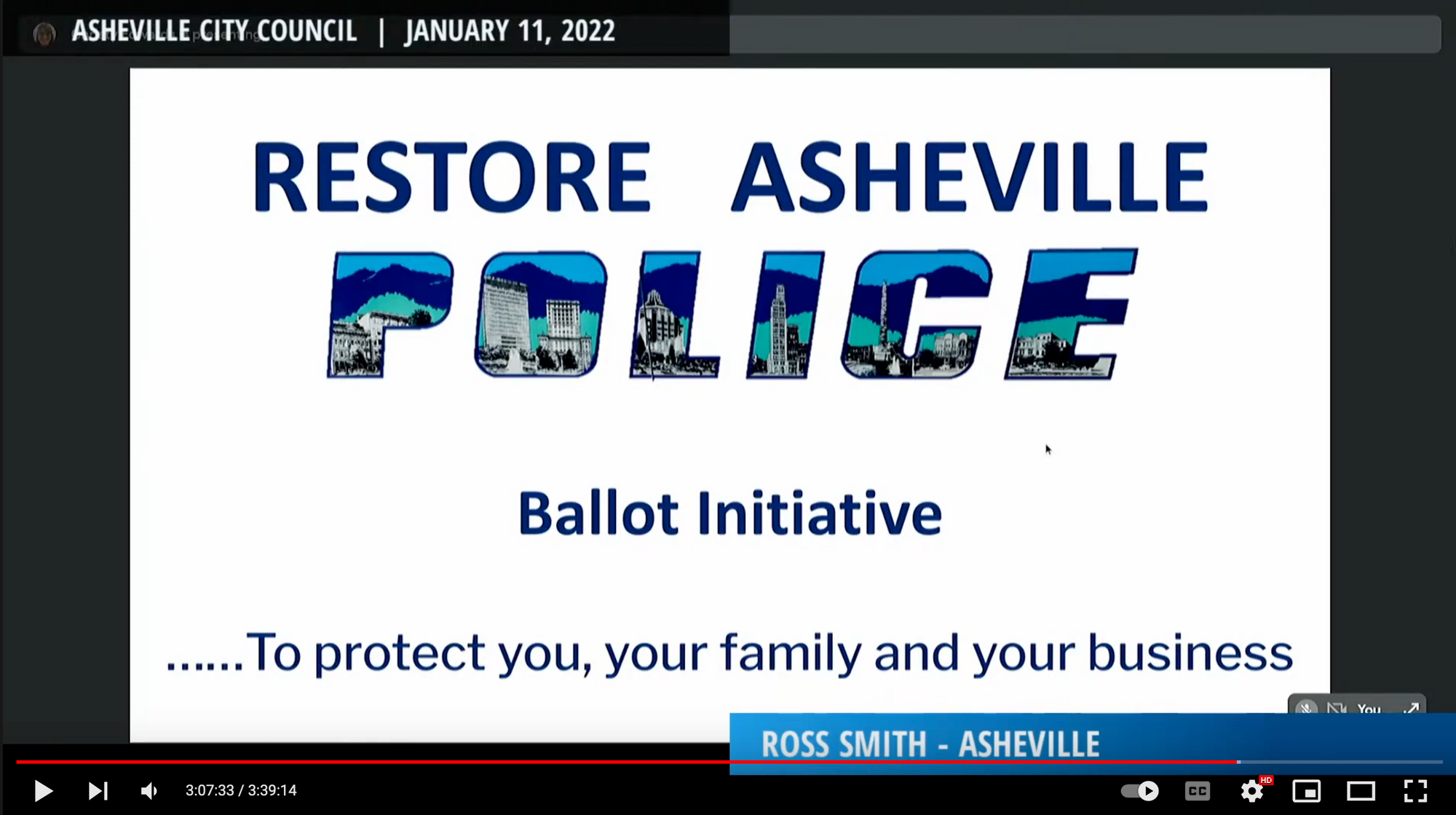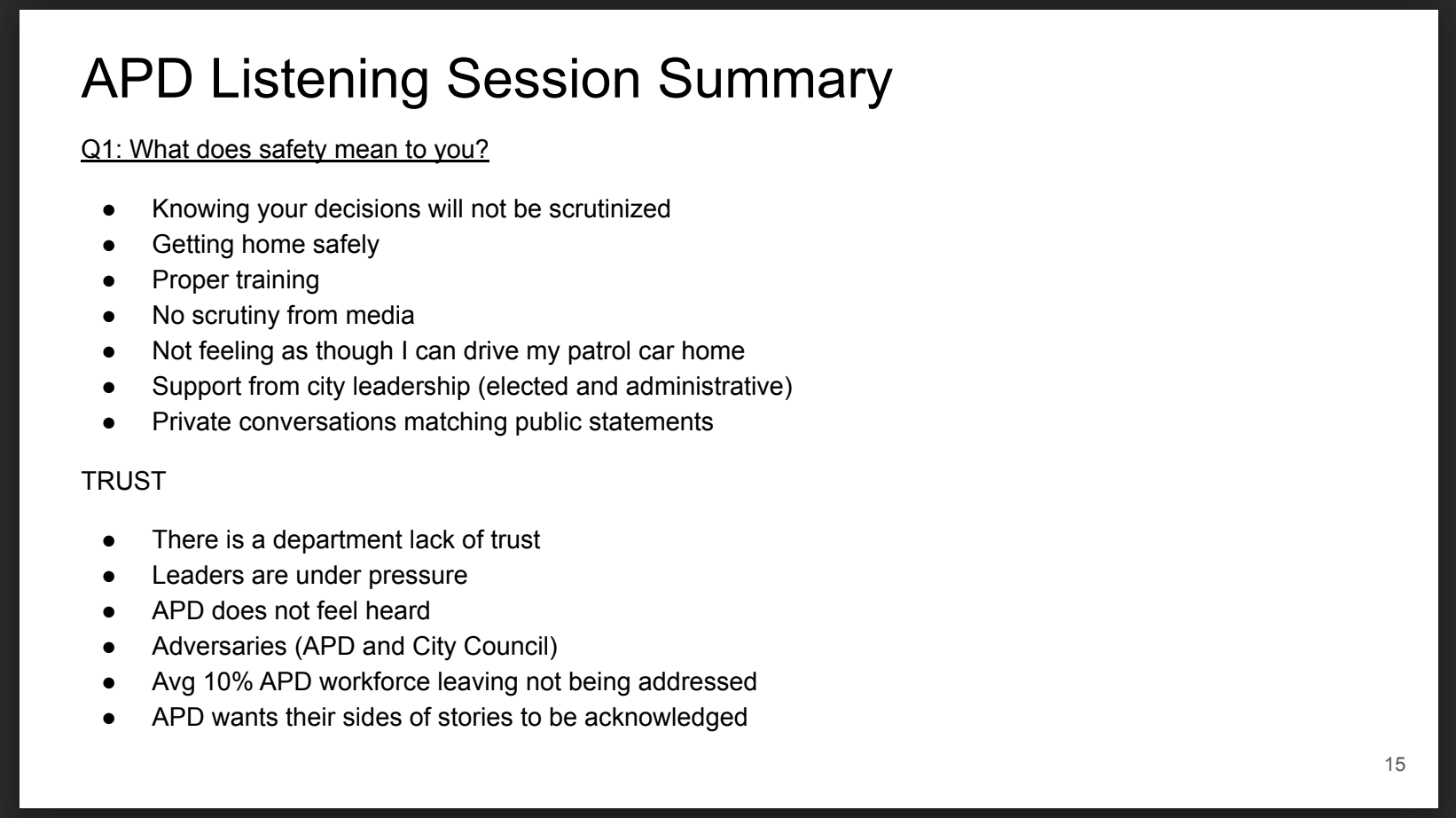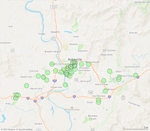“Rebuke!” is The Asheville Free Press’ criticism column. It combines fact-based analysis with a clear perspective on issues that affect our communities.
On January 11th, during the public comment portion of the regularly scheduled Asheville City Council meeting, Ross Smith called to announce a new ballot initiative: “Restore Asheville Police.”
Smith described the group behind the new ballot initiative (and associated website) as “a group of concerned citizens dedicated to reversing a dangerous trend in public safety.” Smith warned listeners that Asheville is in a “public safety perfect storm” consisting of “the convergence of more crime, less police, and an unhelpful city government.”

The components of the “public safety perfect storm” as outlined by Smith can only be understood through numbers. Is there statistically more crime in Asheville than in previous years? Are there fewer active-duty officers in Asheville right now? Has the city government refused to support policy that would further policing?
What we need to be restored in Asheville is a clear-eyed, fact-based perspective on who is actually under attack and in need of shelter, ballot initiatives, and focused campaigns by concerned residents.
Rising Crime and Fewer Cops?
An attempt during the January 11th Council meeting to highlight an increase in crime near homeless encampments was more confusing than concerning.
A slide entitled “large encampment crime issues” painted camps that existed for a matter of weeks in 2020 and 2021 as the reason for rises in everything from motor vehicle thefts to suspicious deaths over the last two years. Did the crimes occur during the weeks that the camps existed or during the months that preceded the camps’ creation? We aren’t told.
However, Asheville Police Department’s own data shows that overall, crimes against persons, property, and society are all down from last year. The number of homicides dropped, and gun violence fell in 2021.
Again and again over the last year, the public has been furnished with different numbers that highlight dropping employment numbers in the Asheville Police Department. Even the New York Times published a lengthy piece over the summer about how beleaguered the local department is.
Lots of officers have quit in the last two years, but high turnover and low morale have been cited as major issues within the department since Tammy Hooper was hired as chief of police in 2015. APD’s weak retention rate is a multi-year trend despite an ever-growing budget.
There is no crime wave in Asheville, but there are fewer people who want to be police officers right now.
Is City Council Really Anti-Police?
Ross Smith claims that the third element of Restore Asheville Police’s public safety perfect storm, and the reason for the high resignation rate among officers, is “primarily because the city administration does not support them or any other law and order approach to public safety.” Is this based in reality?
Since the current Council took office in December of 2020, issues directly affecting the police budget have been on the agenda seven times. APD asked for money for new rifles, new bulletproof vests, to reallocate a portion of their budget to hire a recruitment firm, to receive a private grant for more training, to receive federal “High-Intensity Drug Trafficking Area” dollars, and to maintain their current 30 million dollar budget despite not having enough officers to fill the roles outlined in the budget.
In six of those seven decisions, the Council voted 6 to 1 in favor of APD’s request. In the seventh decision, accepting money from the Department of Justice to purchase new rifles, the vote was 5 to 2 vote in favor of APD’s request. This Council has not told APD “no” once in over a year.
The numbers situate this Council as more pro-police than any Council in recent memory. It is unclear how the Council could be more helpful to the local police department outside of removing Kim Roney (the consistent “no” vote) and voting unanimously in favor of their efforts every single time.
Over the summer, Chief David Zack noted that there “is not a single issue” contributing to the high rate of defection among local officers. And indeed, the engagement summary from the 2020 Reimagine Public Safety project brings up lots of issues that have left officers disgruntled and feeling “unsafe.”
Forty APD employees agreed that what safety meant for them was “knowing your decisions will not be scrutinized” and that there would be “no scrutiny from media.” These employees said that they didn’t feel respected or heard. They said that local politics had made it impossible to do their jobs.

Public and media scrutiny cannot realistically be eliminated for any government employee. It’s not an appropriate ask, and it isn’t feasible. But if ever there was a place where police could receive consistent support from the government and the public, it’s a resort town like Asheville.
Order maintenance or “quality-of-life” policing makes tourism economies run smoothly and guarantees rapid gentrification, and Asheville Police have upheld their end of the bargain. Asheville’s tourism economy is thriving despite a global pandemic, and APD has been thanked with grand gestures like the purchase of a “thank you” billboard by a local group of business owners.
How could local police officers feel anything but affirmed when business owners support them, City Council votes in favor of their every request, crime rates are lower, and they have more money? When they are responding to fewer calls, managing fewer employees, and national media outlets are telling their side of the story?
In short, Asheville police have surrounded themselves with stories of their own supposed victimization and overblown the story of occasional civil protest following the murder of George Floyd into something dangerous and constant. The Fraternal Order of Police has assured beat officers that they are under attack from every corner. Restore Asheville Police is telling the public that the dwindling police force is the result of some conspiratorial effort by a liberal, anti-cop body of elected officials, and a new law is needed to save policing. In the retelling of the gassing of protesters in the summer of 2020, the armored cops are the ones under attack.
In the retelling of the gassing of protesters in the summer of 2020, the armored cops are the ones under attack.
The majority of Asheville’s residents are silent on the issue of “reimagining public safety” and support the status quo. The scrutiny APD receives from mainstream local media is negligible. The Asheville Police Department has been sheltered by a pro-law enforcement Council, a conflict-avoidant populace, and a pro-tourism business class.
Police may feel unsupported, but the numbers show that support for them is overwhelming. There is no public safety perfect storm. And what we need to be restored in Asheville is a clear-eyed, fact-based perspective on who is actually under attack and in need of shelter, ballot initiatives, and focused campaigns by concerned residents.
We Live in Curated Realities.
The damage social media has done to our understanding of the truth is much discussed. The curation of our social media feeds means that we often only see things that bolster our ideas and political viewpoints. If we are interested in a specific socio-political dilemma, we follow accounts that confirm that our worries are well-founded and that our concerns are in need of redress.
The extended period of isolation in response to the pandemic has exacerbated this situation. Many of us are only seeing our closest friends, the people with whom we have most in common, on a regular basis.
Without the careful consideration of good research and solid data, any of us, particularly in this moment, could be swept into believing that the particularities of the media we consume and the conversations we have with like-minded friends are the whole of reality.
But what if a town stopped looking at facts and started believing that the ideas of a few and the optics of a handful of protests had fundamentally altered the operations of a whole municipal body? Based on the contents of the most recent City Council meetings, it seems that Asheville residents live in that ill-fated town.
Hill Brown has lived, worked, and organized in Western North Carolina for the last decade.





